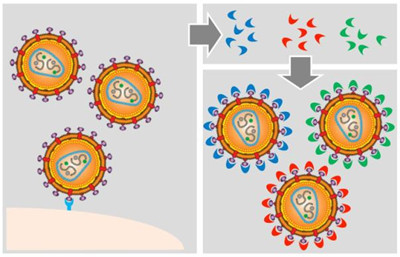(单词翻译:单击)
听力文本
Scientists Say Genetically Modified Rice Can Prevent HIV
Researchers say a new genetically modified rice can prevent infections of HIV, the virus responsible for the disease AIDS.
The researchers recently published their findings in a study in the journal Proceedings of the National Academy of Sciences (PNAS). The team included scientists from America, Britain and Spain.
The study reports the newly-developed rice produces proteins that attach directly to the HIV virus. This process prevents the virus from mixing with human cells. The scientists say this can neutralize the virus and block its transmission.
The Joint United Nations Program on HIV/AIDS or UNAIDS reports that worldwide, nearly 37 million people were living with HIV in 2017. The organization says the largest number of those were in developing countries. Nearly two-thirds of HIV cases are in Africa.
There is currently no cure for HIV/AIDS. But there have been major developments in oral drug treatments shown to slow the progression of the disease. Such treatments can also reduce the chances of passing the virus onto others. Researchers have also worked on finding a vaccine.
UNAIDS says new HIV infections and AIDS-related deaths have been reduced by about 50 percent over the past two decades.

The new study predicts the rice-based method will lead to long-term deployment of the anti-HIV treatment across the developing world. Researchers said the "groundbreaking" discovery is "realistically the only way" that anti-HIV combination treatments can be produced at a cost low enough for the developing world.
The scientists say the easiest and most cost-effective way to use the rice will be to make it into a cream to be put on the skin. The HIV-fighting proteins can then enter the body through the skin.
People in all parts of the world could grow the rice and make the cream themselves, the researchers said. This would prevent the cost and travel required for many patients to receive treatments and medicine, especially in the developing world.
The scientific team says further testing is needed to make sure the genetic engineering process does not produce any additional chemicals that could be dangerous to people.
The process of changing the genetic structure of food crops has been debated for some time. Such foods are commonly called GMOs - for genetically modified organisms, or GEs – meaning genetically edited. Critics of genetically engineered crops believe they can harm people.
I'm Bryan Lynn.
重点解析
重点讲解:
1. prevent sb./sth. from doing sth. 阻止;制止;阻碍;
Further treatment will prevent cancer from developing.
进一步的治疗将阻止癌症恶化。
2. pass onto 将…传给;
Then the men pass it onto their wives.
然后,男人传染给他们的妻子。
3. work on 研究;对…作调查;
We work on improving visual acuity.
我们致力于提高视觉的敏锐度。
4. lead to 招致;致使;导致;
Investment in education and research and a strong safety net can lead to a more productive and competitive economy.
教育与科研投资以及强大的社会保障网络,可以催生生产率更高、更具竞争力的经济体。
参考译文
科学家培育出可预防艾滋病病毒感染的转基因水稻
研究人员表示,一种新型转基因水稻可预防艾滋病病毒(HIV)感染,HIV是引发艾滋病的病毒。
研究人员最近在《美国科学院院报》(简称PNAS)上发表了他们的研究成果。该研究团队由来自美国、英国和西班牙的科学家组成。
研究表明,这种新开发出的水稻可产生与艾滋病病毒直接结合的蛋白质。这一过程可阻止该病毒与人类细胞结合。科学家表示,这可以中和艾滋病病毒,并阻止其传播。
联合国艾滋病规划署(简称UNAIDS)发布报告称,2017年全球有近3700万名艾滋病病毒感染者。该组织表示,发展中国家的感染人数最多。近三分之二的艾滋病病毒感染者来自非洲。
目前艾滋病没有治愈方法。但是口服药物治疗方面取得了重大进展,可减缓病情发展。这类治疗方法还能减少病毒传播给他人的机率。研究人员也在努力寻找疫苗。
联合国艾滋病规划署表示,过去20年来,艾滋病病毒新感染者以及艾滋病导致的死亡病例减少了约50%。
这项新研究预测,这种以水稻为基础的方法将促进整个发展中世界抗艾滋病病毒治疗的长期部署。研究人员表示,从实际角度看,这一“突破性的”发现是为发展中世界提供可负担的低成本抗艾滋病病毒联合治疗的“唯一方法”。
科学家表示,使用这种水稻最简单也是最有效的方法是将其制作成涂抹在皮肤上的乳霜。这样一来,对抗艾滋病病毒的蛋白质就能通过皮肤进入体内。
研究人员说,世界各地的人们可以自己种植这种水稻并制作乳霜。这将为许多患者免去接受治疗和服用药物所需的成本和长途跋涉,尤其有利于发展中世界。
该科学团队表示,为了确保这一基因工程在进行过程中不会产生任何可能对人类造成危险的额外化学物质,需要进行进一步测试。
这种改变粮食作物基因结构的过程已经进行了一段时间的辩论。这种食物通常被称为“转基因生物”(简称GMO)或GE,即基因编辑。基因作物的批评者认为,这些食物可能会对人类造成伤害。
布莱恩·林恩报道。
译文为可可英语翻译,未经授权请勿转载!


